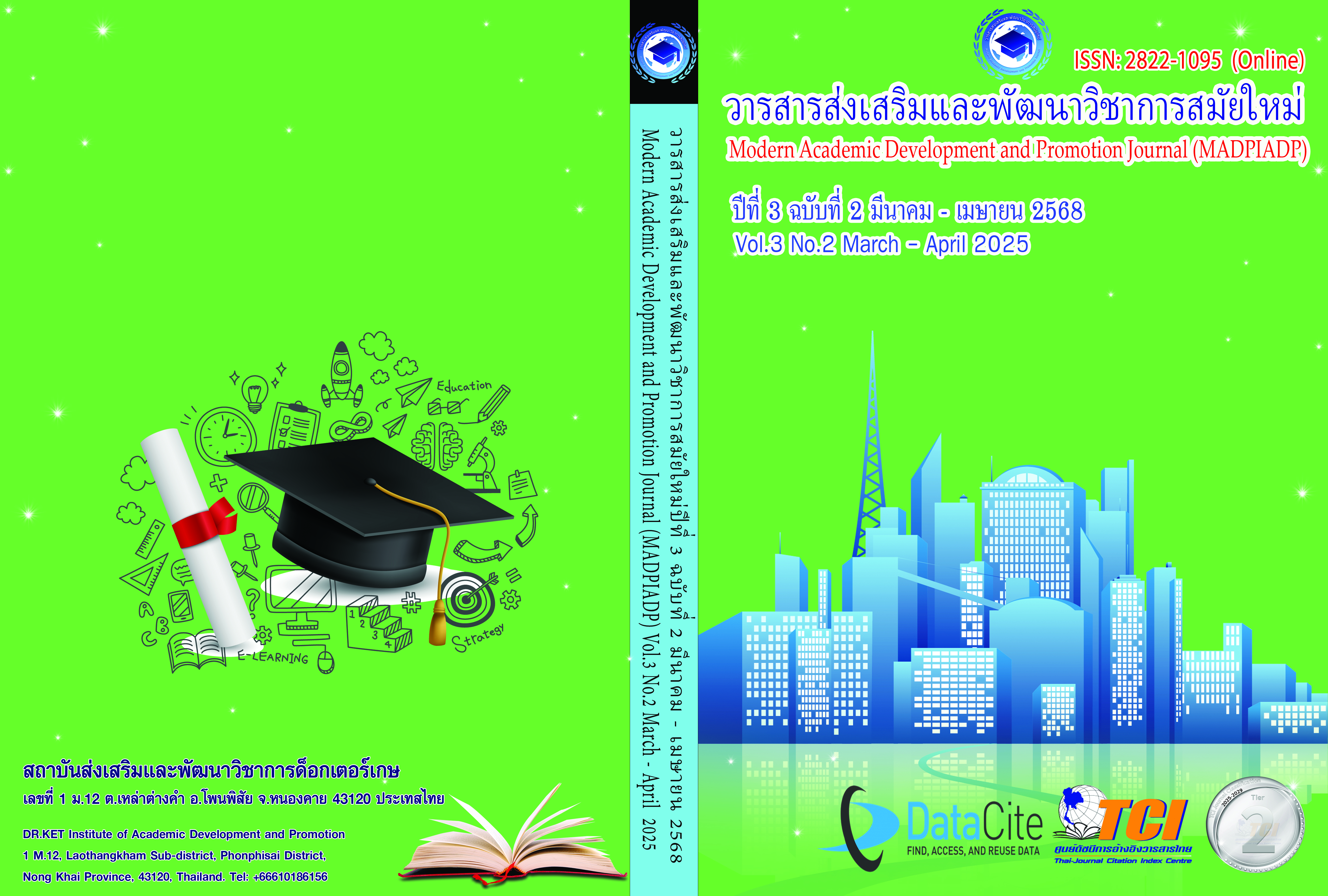GUIDELINES FOR ESG MANAGEMENT IN COMPREHENSIVE HEALTH AND BEAUTY SUPPLEMENT BUSINESSES WITH BEST PRACTICES FOR SUSTAINABILITY
Main Article Content
บทคัดย่อ
-
This research aimed to: (1) study the current and desired states of ESG (Environmental, Social, and Governance) management in comprehensive health and beauty supplement businesses with good sustainability practices, and (2) propose guidelines for ESG management in these businesses. The sample consisted of 400 participants, including executives, employees, and stakeholders, selected through multi-stage sampling. A quantitative research methodology was employed, using a five-point Likert scale questionnaire as the research instrument. Data were analyzed using mean and standard deviation statistics.
The findings revealed that: (1) the current state of ESG management, both overall and in specific dimensions, was at a moderate level, whereas the desired state, both overall and in specific dimensions, was at a high level;(2) proposed guidelines for improving ESG management include adopting sustainable processes, enhancing transparency in governance, emphasizing social responsibility, and integrating strategic ESG practices into operations. Achieving these objectives is critical for ensuring long-term sustainability and growth.
Article Details
เอกสารอ้างอิง
Cochran, W. G. (1977). Sampling technique.s (3rd ed.). New York: John Wilay & Sons.
Issa, A., & Hanaysha, J. R. (2023). Breaking the glass ceiling for a sustainable future: the power of women on corporate boards in reducing ESG controversies. International Journal of Accounting & Information Management, 31(4), 623-646
Jaouhari, Y., Travaglia, F., Giovannelli, L., Picco, A., Oz, E., Oz, F., & Bordiga, M. (2023). From industrial food waste to bioactive ingredients: A review on the sustainable management and transformation of plant-derived food waste. Foods, 12(11), 2183.
Lee, J., & Kwon, K. H. (2022). Sustainable changes in beauty market trends focused on the perspective of safety in the post‐coronavirus disease‐19 period. Journal of cosmetic dermatology, 21(7), 2700-2707.
Michalski, D. (2024). Operationalization of ESG-Integrated Strategy Through the Balanced Scorecard in FMCG Companies. Sustainability, 16(21), 9174.
Spitzer, T. M., & Kreca, K. (2022). ESG Colourwashing: Combating Modern-Day Corporate Hypocrisy. Int'l. In-House Counsel J., 15, 7573.
Selim, O. (2020). ESG and AI: the beauty and the beast of sustainable investing. In Sustainable Investing (pp. 227-243). Routledge.
Tiscini, R., Martiniello, L., & Lombardi, R. (2022). Circular economy and environmental disclosure in sustainability reports: Empirical evidence in cosmetic companies. Business Strategy and the Environment, 31(3), 892-907.
Worapongpat.N. (2021). Marketing management strategies for food supplement manufacturing businesses in Mueang District, Samut Sakhon. Journal of Arts, Rajamangala University of Technology Suvarnabhumi, 3(2), 161-174.
Worapongpat.N. (2020). Excellence organization characteristics and their impact on the performance of small and medium-sized businesses in Northeastern Thailand. Panya Pittayakom Journal, Panya Pittayakom Institute of Technology, 12(1), 30-45.
Worapongpat.N. (2023). The marketing mix factors influencing the use of business outsourcing for food supplement manufacturing, SCG Grand Co., Ltd. Management and Communication Studies Journal, Faculty of Management Science, Rajabhat University Chiang Mai, 5(1), 1-17.
Worapongpat.N. (2023). Improving service quality and the effectiveness of support departments in the direct business of health food supplement industry TDSA after the COVID-19 situation. Journal of Arts, Rajamangala University of Technology Suvarnabhumi, 4(1), 16-25.
Worapongpat.N. (2023). Service quality in the food supplement manufacturing business in Mueang District, Samut Sakhon. Journal of Political Science, Mahamakut Buddhist University, 1(2), 41-51.
Worapongpat.N. (2023). Application of lean production systems to reduce costs in the production process of jelly-type appetite-suppressing products. Academic Journal of Eastern Thailand Institute of Technology, 2(1), 1-13.
Worapongpat.N. (2023). Development strategies for TKN Co., Ltd. to enter the green industry at level 4: Green culture. Journal of Management and Sustainable Development, 2(2), 83-93.
Worapongpat.N. (2023). Designing multipurpose car seats for MCE Co., Ltd. Journal of Management, Administration, and Sustainable Development, 1(2), 243-252.
Worapongpat.N. (2023). Human resource management according to the 7 qualities of a good person in industrial factories in Chonburi Province. Journal of Buddhist Studies in the Mekong River Basin, 6(2), 1-18.
Worapongpat.N, & Napadanai Jirojantrakit. (2024). Enhancing production line capabilities in detergent manufacturing processes in Chonburi Province. Journal of Management, Administration, and Sustainable Development, 2(2), 497-504.
Worapongpat.N, & Chaimongkol Promkham. (2024). The leadership characteristics of managers according to the 4 qualities of a good person in egg-laying chicken farms in Nong Yai District, Chonburi Province. Journal of Buddhist Studies in the Mekong River Basin, 7(1), 1-14.
Worapongpat.N, Udomphothiwit, Phra Kru, & Kraisorn, Pipat. (2024). Management of electronic industries based on the 7 qualities of a good person in Laem Chabang Port Industrial Estate, Chonburi Province. Journal of Buddhist Studies in the Mekong River Basin, 7(1), 15-32.
Worapongpat.N, Yodkham, Ekarat, Limlerttrit, Thitipong, & Srichan, Priya. (2024). Designing factory layout and system for CPT manufacturing industries. Journal of Eastern Thailand Institute of Technology, 3(1), 41-47.
Worapongpat.N. (2024). Strategic leadership according to the 4 Brahmavihāra principles in food supplement manufacturing businesses in Mueang District, Samut Sakhon. Journal of Social Studies, Religion, and Culture, 5(2), 53-65.


